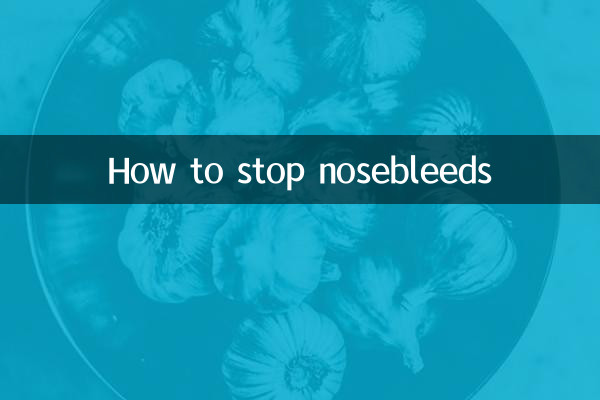How to stop nosebleeds
Nose bleeding is a common phenomenon that can be caused by dry air, trauma, high blood pressure, or other health problems. Although nosebleeds are not serious in most cases, it is very important to master the correct method of stopping the bleeding. This article will combine popular topics and hot content on the entire network for the past 10 days to provide you with a detailed guide to stop nosebleeds.
1. Common causes of nosebleed

According to recent hot topics on the Internet, common causes of nosebleeds include:
| reason | Percentage | Remark |
|---|---|---|
| Dry air | 35% | High incidence in autumn and winter |
| Trauma or nose picking | 25% | Common to children |
| hypertension | 15% | Middle-aged and elderly people need to pay attention |
| Allergic reactions | 10% | Pollen season increases |
| Other reasons | 15% | Including blood diseases, etc. |
2. Correct bleeding stop steps
According to recent content shared by medical experts on social media, the following are scientific and effective methods to stop bleeding:
1.keep Calm: Nervousness can increase blood pressure and aggravate bleeding
2.Sit up straight: The head is slightly forward to avoid blood flow
3.Press the nose wing: Pinch the soft part of the nose with your thumb and index finger for 10-15 minutes
4.Cold compress: Apply an ice pack on the bridge of the nose or forehead to help blood vessels contract
5.Avoid irritation: Do not blow your nose or exercise vigorously within 24 hours after stopping the bleeding
3. Common mistakes
In recent online discussions, many people have shared wrong methods of stopping bleeding, and special attention is needed:
| Wrong way | harm |
|---|---|
| Head up | May cause blood to flow into the throat and cause choking |
| Snack tissue | May cause secondary damage and cannot effectively stop bleeding |
| Rinse with cold water | May stimulate blood vessels and prolong bleeding time |
| Lying down immediately | Increases nasal pressure, which is not conducive to stopping blood |
4. Measures to prevent nosebleeds
According to recent health bloggers’ recommendations, the following measures can be taken to prevent nosebleeds:
1.Keep your nasal moist: Use saline spray or apply Vaseline
2.Control indoor humidity: Use a humidifier to keep the humidity between 40% and 60%
3.Avoid irritation: Reduce nose-picking, blowing your nose hard, etc.
4.Diet conditioning: Increase vitamin C and K intake
5.Control blood pressure: Patients with hypertension need regular monitoring
5. When do you need medical treatment?
According to recent announcements from medical institutions, seek medical treatment immediately if the following situations occur:
| Condition | Possible Causes |
|---|---|
| Bleeding lasts for more than 20 minutes | Severe vascular injury |
| Massive bleeding | Probably arterial bleeding |
| Frequent attacks | Potential blood disease |
| Accompanied by dizziness and fatigue | Probably excessive blood loss |
| Hemorrhage after trauma | Possible nasal fracture |
6. Things to note for special groups
According to recent parenting experts and senior health columns:
1.child: Teach not to pick your nose and keep your nails short and clean
2.Pregnant woman: Hormone changes during pregnancy can easily lead to nosebleeds, so be careful
3.Elderly: People taking anticoagulant drugs have a high risk of bleeding and need to be prevented in advance
4.athlete: Pay attention to protecting your nose when exercising to avoid impact
7. Care after nosebleed
According to recent rehabilitation medical experts’ suggestions:
1. Avoid strenuous exercise within 24 hours after stopping the bleeding
2. Keep your head slightly higher than your heart
4. Observe whether there are signs of rebleeding
5. If you use drugs to stop bleeding, you must follow the doctor's advice
Through the above scientific methods, most nosebleeds can be effectively controlled. Remember, prevention is better than treatment, and taking good nasal care is the key. If abnormal situations occur, be sure to seek medical treatment in time to avoid delaying treatment.